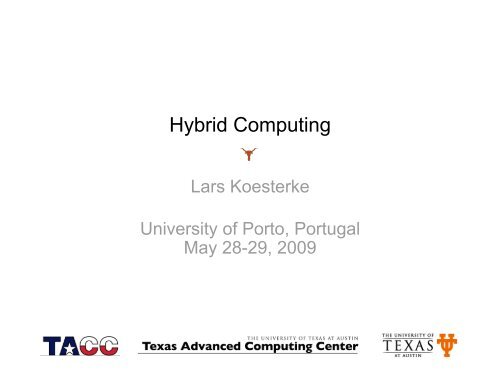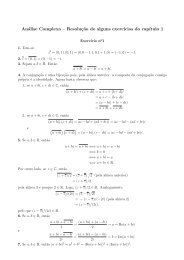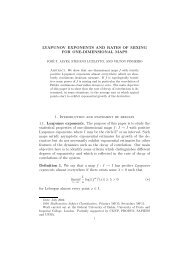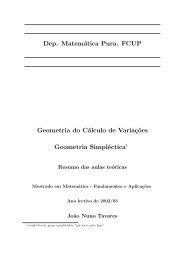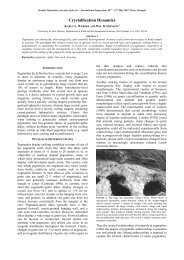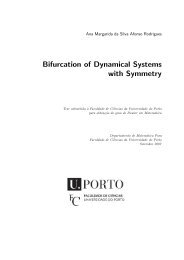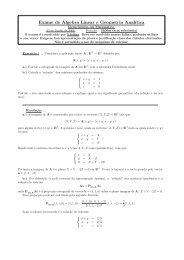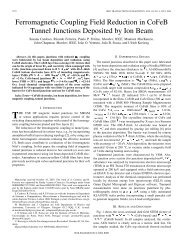slides - Spring School in Advanced Computing TACC @ UP
slides - Spring School in Advanced Computing TACC @ UP
slides - Spring School in Advanced Computing TACC @ UP
Create successful ePaper yourself
Turn your PDF publications into a flip-book with our unique Google optimized e-Paper software.
Hybrid Comput<strong>in</strong>g<br />
Lars Koesterke<br />
University of Porto, Portugal<br />
May 28-29, 2009
Why Hybrid?<br />
• Elim<strong>in</strong>ates doma<strong>in</strong> decomposition at node<br />
• Automatic coherency at node<br />
• Lower memory latency and data<br />
movement with<strong>in</strong> node<br />
• Can synchronize on memory <strong>in</strong>stead of<br />
barrier<br />
2
Why Hybrid? (cont 1)<br />
• Only profitable if on-node aggregation of<br />
MPI parallel components is faster as a<br />
s<strong>in</strong>gle SMP algorithm (or a s<strong>in</strong>gle SMP<br />
algorithm on each socket).<br />
3
Hybrid - Motivation<br />
• Load Balanc<strong>in</strong>g<br />
• Reduce Memory Traffic<br />
CPU-bound<br />
Memory-bound<br />
4
Node Views<br />
CPU<br />
OpenMP<br />
CPU<br />
CPU<br />
CPU<br />
CPU<br />
CPU<br />
CPU<br />
CPU<br />
CPU<br />
CPU<br />
CPU<br />
CPU<br />
CPU<br />
CPU<br />
CPU<br />
CPU<br />
CPU<br />
CPU<br />
CPU<br />
CPU<br />
CPU<br />
CPU<br />
CPU<br />
CPU<br />
CPU<br />
CPU<br />
CPU<br />
CPU<br />
CPU<br />
CPU<br />
CPU<br />
CPU<br />
MPI<br />
0<br />
1<br />
2 3<br />
CPU <br />
CPU <br />
CPU <br />
CPU <br />
CPU <br />
CPU <br />
CPU <br />
CPU <br />
CPU <br />
CPU <br />
CPU <br />
CPU <br />
CPU <br />
CPU <br />
CPU <br />
CPU <br />
Process-<br />
Aff<strong>in</strong>ity<br />
Memory-<br />
Allocation<br />
5
NUMA Operations<br />
• Where do threads/processes and memory allocations go?<br />
• If Memory were completely uniform there would be no<br />
need to worry about these two concerns. Only for NUMA<br />
(non-uniform memory access) is (re)placement of<br />
processes and allocated memory (NUMA Control) of<br />
importance.<br />
• Default Control: Decided by policy when process exec’d or<br />
thread forked, and when memory allocated. Directed from<br />
with<strong>in</strong> Kernel.<br />
6
NUMA Operations<br />
• Ways Process Aff<strong>in</strong>ity and Memory Policy can be<br />
changed:<br />
– Dynamically on a runn<strong>in</strong>g process (know<strong>in</strong>g process id)<br />
– At process execution (with wrapper command)<br />
– With<strong>in</strong> program through F90/C API<br />
• Users can alter Kernel Policies<br />
(sett<strong>in</strong>g Process Aff<strong>in</strong>ity and Memory Policy == PAMPer)<br />
– Users can PAMPer their own processes.<br />
– Root can PAMPer any process.<br />
– Careful, libraries may PAMPer, too!<br />
7
NUMA Operations<br />
• Process Aff<strong>in</strong>ity and Memory Policy can be<br />
controlled at socket and core level with numactl.<br />
CPU <br />
2 <br />
CPU <br />
CPU <br />
3 <br />
CPU <br />
2 <br />
CPU <br />
CPU <br />
CPU <br />
CPU <br />
3 <br />
8,9,10,11 <br />
CPU <br />
CPU <br />
12,13,14,15 <br />
CPU <br />
CPU <br />
CPU <br />
CPU <br />
CPU <br />
CPU <br />
CPU <br />
CPU <br />
CPU <br />
CPU <br />
CPU <br />
CPU <br />
CPU <br />
CPU <br />
CPU <br />
CPU <br />
CPU <br />
CPU <br />
CPU <br />
CPU <br />
CPU <br />
CPU <br />
CPU <br />
CPU <br />
CPU <br />
CPU <br />
CPU <br />
1 <br />
CPU <br />
CPU <br />
0 <br />
CPU <br />
1 <br />
CPU <br />
CPU <br />
CPU <br />
CPU <br />
0 <br />
CPU <br />
CPU <br />
4,5,6,7 <br />
CPU <br />
CPU <br />
0,1,2,3 <br />
Process: Socket References Memory: Socket References <br />
process assignment <br />
memory allocaFon <br />
‐N <br />
–l –i ‐‐peferred –m <br />
(local, <strong>in</strong>terleaved, pref., mandatory) <br />
Process: Core References <br />
core assignment <br />
–C <br />
8
Modes of MPI/Thread Operation<br />
• SMP Nodes<br />
• S<strong>in</strong>gle MPI task launched per node<br />
• Parallel Threads share all node memory, e.g 16 threads/<br />
node on Ranger.<br />
• SMP Sockets<br />
• S<strong>in</strong>gle MPI task launched on each socket<br />
• Parallel Thread set shares socket memory,<br />
e.g. 4 threads/socket on Ranger<br />
• MPI Cores<br />
• Each core on a node is assigned an MPI task.<br />
• (not really hybrid, but <strong>in</strong> master/slave paradigm master could<br />
use threads)<br />
9
Modes of MPI/Thread Operation<br />
Pure MPI Node <br />
Pure SMP Node <br />
16 MPI Tasks <br />
4 MPI Tasks <br />
4Threads/Task <br />
1 MPI Tasks <br />
16 Threads/Task <br />
Master Thread of MPI Task <br />
MPI Task on Core <br />
Master Thread of MPI Task <br />
Slave Thread of MPI Task <br />
10
SMP Nodes<br />
Hybrid Batch Script 16 threads/node<br />
• Make sure 1 task is created on each node<br />
• Set total number of cores (nodes x 16)<br />
• Set number of threads for each node<br />
• PAMPer<strong>in</strong>g at job level<br />
• Controls behavior for ALL tasks<br />
• No simple/standard way to control thread-core aff<strong>in</strong>ity<br />
job script (Bourne shell)<br />
job script (C shell)<br />
... ...<br />
#! -pe 1way 192 #! -pe 1way 192<br />
... ...<br />
export OMP_NUM_THREADS=16 setenv OMP_NUM_THREADS 16<br />
ibrun numactl –i all ./a.out ibrun numactl –i all ./a.out<br />
11
job script (Bourne shell)<br />
... ...<br />
SMP Sockets<br />
Hybrid Batch Script 4 tasks/node, 4 threads/task<br />
• Example script setup for a square (6x6 = 36) processor topology.<br />
• Create a task for each socket (4 tasks per node).<br />
• Set total number of cores allocated by batch (nodes x 16 cores/node).<br />
• Set actual number of cores used with MY_NSLOTS.<br />
• Set number of threads for each task<br />
• PAMPer<strong>in</strong>g at task level<br />
Create script to extract rank for numactl options, and a.out execution<br />
(<strong>TACC</strong> MPI systems always assign sequential ranks on a node.<br />
No simple/standard way to control thread-core aff<strong>in</strong>ity<br />
job script (C shell)<br />
#! -pe 4way 48 #! -pe 4way 48<br />
... ...<br />
export MY_NSLOTS =36 setenv MY_NSLOTS 36<br />
export OMP_NUM_THREADS=4 setenv OMP_NUM_THREADS 4<br />
ibrun numa.csh<br />
ibrun numa.sh<br />
12
SMP Sockets<br />
Hybrid Batch Script 4 tasks/node, 4 threads/task<br />
numa.sh<br />
numa.csh<br />
for mvapich2<br />
#!/b<strong>in</strong>/bash<br />
export MV2_USE_AFFINITY=0<br />
export MV2_ENABLE_AFFINITY=0<br />
#TasksPerNode<br />
TPN=`echo $PE | sed 's/way//'`<br />
[ ! $TPN ] && echo TPN NOT def<strong>in</strong>ed!<br />
[ ! $TPN ] && exit 1<br />
socket=$(( $PMI_RANK % $TPN ))<br />
numactl -N $socket -m $socket ./a.out<br />
#!/b<strong>in</strong>/tcsh<br />
setenv MV2_USE_AFFINITY 0<br />
setenv MV2_ENABLE_AFFINITY 0<br />
#TasksPerNode<br />
set TPN = `echo $PE | sed 's/way//'`<br />
if(! ${%TPN}) echo TPN NOT def<strong>in</strong>ed!<br />
if(! ${%TPN}) exit 0<br />
@ socket = $PMI_RANK % $TPN<br />
numactl -N $socket -m $socket ./a.out<br />
13
Hybrid – Program Model<br />
• Start with MPI <strong>in</strong>itialization<br />
• Create OMP parallel regions<br />
with<strong>in</strong> MPI task (process).<br />
• Serial regions are the<br />
master thread or MPI task.<br />
• MPI rank is known to all threads<br />
• Call MPI library <strong>in</strong> serial<br />
and parallel regions.<br />
• F<strong>in</strong>alize MPI<br />
14<br />
Program
MPI with OpenMP -- Messag<strong>in</strong>g<br />
S<strong>in</strong>gle-threaded<br />
messag<strong>in</strong>g<br />
Node<br />
Node<br />
rank to rank<br />
MPI from serial region or a s<strong>in</strong>gle thread with<strong>in</strong> parallel region<br />
Multi-threaded<br />
messag<strong>in</strong>g<br />
Node<br />
Node<br />
rank-thread ID to any rank-thread ID<br />
MPI from multiple threads with<strong>in</strong> parallel region<br />
Requires thread-safe implementation<br />
15
Threads call<strong>in</strong>g MPI<br />
• Use MPI_Init_thread to select/determ<strong>in</strong>e MPI’s<br />
thread level of support (<strong>in</strong> lieu of MPI_Init).<br />
MPI_Init_thread is supported <strong>in</strong> MPI2<br />
• Thread safety is controlled by “provided” types:<br />
s<strong>in</strong>gle, funneled, serialized and multiple<br />
• S<strong>in</strong>gle means there is no multi-thread<strong>in</strong>g.<br />
• Funneled means only the master thread calls MPI<br />
• Serialized means multiple threads can call MPI, but<br />
only 1 call can be <strong>in</strong> progress at a time (serialized).<br />
• Multiple means MPI is thread safe.<br />
• Monotonic values are assigned to Parameters:<br />
MPI_THREAD_SINGLE < MPI_THREAD_FUNNELED < MPI_THREAD_SERIALIZED <<br />
MPI_THREAD_MULTIPLE<br />
16
Syntax:<br />
MPI2 MPI_Init_thread<br />
call MPI_Init_thread( irequired, iprovided, ierr)<br />
<strong>in</strong>t MPI_Init_thread(<strong>in</strong>t *argc, char ***argv, <strong>in</strong>t required, <strong>in</strong>t *provided)<br />
<strong>in</strong>t MPI::Init_thread(<strong>in</strong>t& argc, char**& argv, <strong>in</strong>t required)<br />
Support Levels<br />
Description<br />
MPI_THREAD_SINGLE<br />
MPI_THREAD_FUNNELED<br />
MPI_THREAD_SERIALIZE<br />
Only one thread will execute.<br />
Process may be multi-threaded, but only ma<strong>in</strong><br />
thread will make MPI calls (calls are ’’funneled'' to<br />
ma<strong>in</strong> thread). Default<br />
Process may be multi-threaded, any thread can<br />
make MPI calls, but threads cannot execute MPI<br />
calls concurrently (MPI calls are ’’serialized'').<br />
MPI_THREAD_MULTIPLE<br />
Multiple threads may call MPI, no restrictions.<br />
If supported, the call will return provided = required.<br />
Otherwise, the highest level of support will be provided.<br />
17
Hybrid Cod<strong>in</strong>g<br />
<strong>in</strong>clude ‘mpif.h’ <br />
program hybsimp <br />
Fortran C <br />
#<strong>in</strong>clude <br />
<strong>in</strong>t ma<strong>in</strong>(<strong>in</strong>t argc, char **argv){ <br />
<strong>in</strong>t rank, size, ierr, i; <br />
call MPI_Init(ierr) <br />
call MPI_Comm_rank (...,irank,ierr) <br />
call MPI_Comm_size (...,isize,ierr) <br />
! Setup shared mem, comp. & Comm <br />
!$OMP parallel do <br />
do i=1,n <br />
<br />
enddo <br />
! compute & communicate <br />
call MPI_F<strong>in</strong>alize(ierr) <br />
end <br />
ierr= MPI_Init(&argc,&argv[]); <br />
ierr= MPI_Comm_rank (...,&rank); <br />
ierr= MPI_Comm_size (...,&size); <br />
//Setup shared mem, compute & Comm <br />
#pragma omp parallel for <br />
for(i=0; i
MPI Call through Master<br />
• MPI_THREAD_FUNNELED<br />
• Use OMP_BARRIER s<strong>in</strong>ce there is no<br />
implicit barrier <strong>in</strong> master workshare<br />
construct (OMP_MASTER).<br />
• All other threads will be sleep<strong>in</strong>g.<br />
19
Funnel<strong>in</strong>g through Master<br />
<strong>in</strong>clude ‘mpif.h’ <br />
program hybmas <br />
!$OMP parallel <br />
!$OMP barrier <br />
!$OMP master <br />
call MPI_(…,ierr) <br />
!$OMP end master <br />
!$OMP barrier <br />
!$OMP end parallel <br />
end <br />
Fortran C <br />
#<strong>in</strong>clude <br />
<strong>in</strong>t ma<strong>in</strong>(<strong>in</strong>t argc, char **argv){ <br />
<strong>in</strong>t rank, size, ierr, i; <br />
#pragma omp parallel <br />
{ <br />
#pragma omp barrier <br />
#pragma omp master <br />
{ <br />
ierr=MPI_(…) <br />
} <br />
#pragma omp barrier <br />
} <br />
} <br />
20
MPI Call with<strong>in</strong> S<strong>in</strong>gle<br />
• MPI_THREAD_SERIALIZED<br />
• Only OMP_BARRIER at beg<strong>in</strong>n<strong>in</strong>g,<br />
s<strong>in</strong>ce there is an implicit barrier <strong>in</strong><br />
SINGLE workshare construct<br />
(OMP_SINGLE).<br />
• All other threads will be sleep<strong>in</strong>g.<br />
• (The simplest case is for any thread to execute a s<strong>in</strong>gle mpi call,<br />
e.g. with the “s<strong>in</strong>gle” omp construct. See next slide.)<br />
21
<strong>in</strong>clude ‘mpif.h’ <br />
program hybs<strong>in</strong>g <br />
Serialize through S<strong>in</strong>gle<br />
call mpi_<strong>in</strong>it_thread(MPI_THREAD_SERIALIZED, <br />
iprovided,ierr) <br />
!$OMP parallel <br />
!$OMP barrier <br />
!$OMP s<strong>in</strong>gle <br />
call MPI_(…,ierr) <br />
!$OMP end s<strong>in</strong>gle <br />
Fortran C <br />
#<strong>in</strong>clude <br />
<strong>in</strong>t ma<strong>in</strong>(<strong>in</strong>t argc, char **argv){ <br />
<strong>in</strong>t rank, size, ierr, i; <br />
mpi_<strong>in</strong>it_thread(MPI_THREAD_SERIALIZED, <br />
iprovided) <br />
#pragma omp parallel <br />
{ <br />
#pragma omp barrier <br />
#pragma omp s<strong>in</strong>gle <br />
{ <br />
ierr=MPI_(…) <br />
} <br />
!!OMP barrier <br />
!$OMP end parallel <br />
end <br />
//pragma omp barrier <br />
} <br />
} <br />
22
Overlapp<strong>in</strong>g Communication and<br />
Work<br />
• One core can saturate the PCI-e<br />
network bus. Why use all to<br />
communicate?<br />
• Communicate with one or several cores.<br />
• Work with others dur<strong>in</strong>g communication.<br />
• Need at least<br />
MPI_THREAD_FUNNELED support.<br />
• Can be difficult to manage and load<br />
balance!<br />
23
Overlapp<strong>in</strong>g Communication and<br />
Work<br />
<strong>in</strong>clude ‘mpi.h’ <br />
program hybover <br />
!$OMP parallel <br />
if (ithread .eq. 0) then <br />
call MPI_(…,ierr) <br />
else <br />
<br />
endif <br />
!$OMP end parallel <br />
end <br />
Fortran C <br />
#<strong>in</strong>clude <br />
<strong>in</strong>t ma<strong>in</strong>(<strong>in</strong>t argc, char **argv){ <br />
<strong>in</strong>t rank, size, ierr, i; <br />
#pragma omp parallel <br />
{ <br />
if (thread == 0){ <br />
ierr=MPI_(…) <br />
} <br />
if(thread != 0){ <br />
work <br />
} <br />
} <br />
24
Thread-rank Communication<br />
• Can use thread id and rank <strong>in</strong><br />
communication<br />
• Example illustrates technique <strong>in</strong> multithread<br />
“p<strong>in</strong>g” (send/receive) example.<br />
25
Thread-rank Communication<br />
…<br />
call mpi_<strong>in</strong>it_thread( MPI_THREAD_MULTIPLE, iprovided,ierr)<br />
call mpi_comm_rank(MPI_COMM_WORLD, irank, ierr)<br />
call mpi_comm_size( MPI_COMM_WORLD,nranks, ierr)<br />
…<br />
!$OMP parallel private(i, ithread, nthreads) <br />
… <br />
nthreads=OMP_GET_NUM_THREADS() <br />
Communicate between ranks.<br />
ithread =OMP_GET_THREAD_NUM() <br />
call pwork(ithread, irank, nthreads, nranks…) Threads use tags to differentiate.<br />
if(irank == 0) then <br />
call mpi_send(ithread,1,MPI_INTEGER, 1, ithread, MPI_COMM_WORLD, ierr)<br />
else <br />
call mpi_recv( j,1,MPI_INTEGER, 0, ithread, MPI_COMM_WORLD, istatus,ierr)<br />
pr<strong>in</strong>t*, "Yep, this is ",irank," thread ", ithread," I received from ", j <br />
endif <br />
!$OMP END PARALLEL <br />
end <br />
26
NUMA <strong>in</strong> Code<br />
• Schedul<strong>in</strong>g Aff<strong>in</strong>ity and Memory Policy can be<br />
changed with<strong>in</strong> code through:<br />
– sched_get/setaff<strong>in</strong>ity<br />
– get/set_memory_policy<br />
• Schedul<strong>in</strong>g: Bits <strong>in</strong> a mask are set for assignments.<br />
0<br />
0<br />
0<br />
0<br />
0<br />
0<br />
0<br />
0<br />
0<br />
0<br />
0<br />
0<br />
0<br />
0<br />
0 1<br />
Assignment to Core 0<br />
1<br />
0<br />
0<br />
0<br />
0<br />
0<br />
0<br />
0<br />
0<br />
0<br />
0<br />
0<br />
0<br />
0<br />
0 0<br />
Assignment to Core 15<br />
1<br />
0<br />
0<br />
0<br />
0<br />
0<br />
0<br />
0<br />
0<br />
0<br />
0<br />
0<br />
0<br />
0<br />
0 1<br />
Assignment to Core 0 or 15<br />
27
NUMA <strong>in</strong> Code<br />
• Schedul<strong>in</strong>g Aff<strong>in</strong>ity<br />
…<br />
#<strong>in</strong>clude <br />
…<br />
<strong>in</strong>t icore=3;<br />
cpu_set_t cpu_mask;<br />
…<br />
CPU_ZERO( cpu_mask);<br />
CPU_SET(icore, cpu_mask);<br />
err = sched_setaff<strong>in</strong>ity( (pid_t)0 ,<br />
sizeof(cpu_mask),<br />
&cpu_mask);<br />
Get C<br />
Set core number<br />
Allocate mask<br />
Set mask to zero<br />
Set mask with core #<br />
Set the aff<strong>in</strong>ity<br />
28
Conclusion<br />
• Placement and b<strong>in</strong>d<strong>in</strong>g of processes, and<br />
allocation location of memory are important<br />
performance considerations <strong>in</strong> pure MPI/<br />
OpenMP and Hybrid codes.<br />
• Simple numactl commands and APIs allow<br />
users to control process and memory<br />
assignments.<br />
• 8-core and 16-core socket systems are on the<br />
way, even more effort will be focused on<br />
process schedul<strong>in</strong>g and memory location.<br />
• Expect to see more multi-threaded libraries.<br />
29
References<br />
• www.nersc.gov/nusers/services/tra<strong>in</strong><strong>in</strong>g/classes/NUG/<br />
Jun04/NUG2004_yhe_hybrid.ppt<br />
Hybrid OpenMP and MPI Programm<strong>in</strong>g and Tun<strong>in</strong>g (NUG2004),Yun<br />
(Helen) He and Chris D<strong>in</strong>g, Lawrence Berkeley National Laboratory, June<br />
24, 2004.<br />
• www-unix.mcs.anl.gov/mpi/mpi-standard/mpi-report-2.0/<br />
node162.htm#Node162<br />
• www.tacc.utexas.edu/services/userguides/ranger {See numa section.}<br />
• www.mpi-forum.org/docs/mpi2-report.pdf<br />
• http://www.nersc.gov/nusers/services/tra<strong>in</strong><strong>in</strong>g/classes/NUG/Jun04/<br />
NUG2004_yhe_hybrid.ppt<br />
• www.<strong>in</strong>tel.com/software/products/compilers/docs/fmac/doc_files/source/<br />
extfile/optaps_for/common/optaps_openmp_thread_aff<strong>in</strong>ity.htm<br />
30


